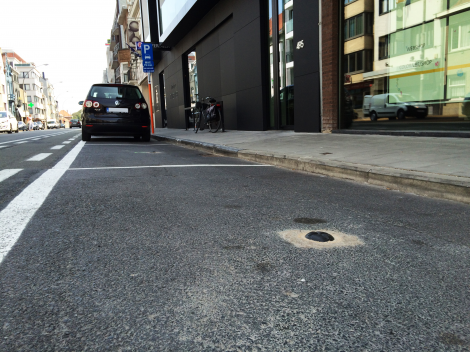Street Smart
An intelligent parking system in the suburb of Pozuelo de Alarcon, in Madrid, Spain, uses advanced sensor technologies to optimize the process of finding a space, while providing city planners with improved parking management.

Orginal text: Chloë Barrow for the Intertraffic World Magazine
With a continuously expanding urban population, finding a car parking space promptly and without fuss is becoming a rare occurrence. In fact, 30% of all moving vehicles in cities at any one time are scouring the roads for an empty spot rather than driving toward. a destination, not only inconveniencing citizens. but adding to congestion and raising levels of pollution. Local councils are therefore having to come up with intelligent, innovative and cost-efficient solutions to combat problematic parking.
As an effective and low-cost solution, more and more cities are turning to 'smart parking' - a system that helps guide drivers to available parking spots via smart technology - in densely congested areas of the city. One such urban district to embrace this innovation is the affluent and leafy suburb of Pozuelo de Alarcon in the Madrid region of Spain. "The standard of life is very high in our city, so we thought, why not start using technology for the services we provide?" says Pablo Rivas Suarez, the technologies councilman at Pozuelo de Alarcon city council.
Pozuelo's smart parking service is part of a comprehensive four-tiered smart-city platform that offers a wide range of practical urban solutions that are specifically designed to meet the needs of its citizens. The platform, which will make Pozuelo a point of reference among smart cities in Spain, was implemented by SICE, a systems integration technology company, and Wairbut, a Spanish consulting, engineering and TIC development company The smart platform comprises a watering system in the 11 parks and gardens of the city, smart public lighting and an energy efficiency system in the city's Hotel Casa Consistorial, as well as smart parking, which guides people to more than 900 available spaces in four different commercial areas in the city.
The parking function works using sensors from Nedap Identification Systems, a Netherlands-based company that specializes in long-range identification of vehicles and drivers. to provide real-time parking data. Drivers can access this information via a free application available on iPhone and Android smartphones.
''You just need to put in the name of the street and it will tell you if there's a free parking space or not." explains Suarez. "If there is, the system puts this free space on your navigator -Google maps or whatever navigator you use on your phone - and it will take you easily to the free parking space."
Smart Investment
From a technological perspective, it is notable that the battery-operated parking sensors share information, meaning that one sensor talks to another one, sharing its ID and its status. "This data is then communicated throughout the network as soon as it finds a gateway, or central server, which provides an outlet for this information", explains Jan Hofman, senior business development manager for Nedap Identification Systems.
The dual-detection sensors use a combination of infrared and electromagnetic technologies to ensure optimum data accuracy. "We also provide a hosting service, from which our partners can get the data and process it into their own parking guiding application or whatever application they may have in mind", Hofman adds. One of the main advantages of installing a smart parking system, as Hofman explains, is cost efficiency. "The main challenge we face is to convince local governments that investing in systems like this is not costing money, but rather making money for them. It enables them to optimize the use of their existing parking capacity instead of needing to invest in new parking spaces", he says. Another notable perk is the speed and ease of installation. "The smart parking system was very easy to plan and install", says Pozuelo de Alarcon's Suarez. "In just 48 hours we were able to equip 1000 spaces. You just need to make a small hole and introduce the sensor into each space."
Smart Economics
According to Suarez, the new smart parking system reduces the time spent looking for a parking space in the main commercial area by approximately three minutes, meaning it enables Pozuelo's citizens to enjoy hassle-free parking, as well as improving business in these areas. "Parking is something that is very useful, not only for our citizens who are using it, but also for the commercial areas, as it makes it easier for people to park around their shops", he says.
In addition to boosting commerce in the area, the system has brought about other practical and financial perks. "The main benefit of a solution like this is that it provides infor mation about open parking locations that you didn't have up until now", says Hoffman "For instance, it gives parking enforcement officers information about how long vehicles have stayed on a single space, so you can use it for overstay detection." Another unexpected financial advantage is the positive influence the parking sensors can have on payment of parking fees. "Just by noticing the sensors in the ground and realizing it was some kind of monitoring system, people tend to be more disciplined about paying parking fees", Hofman reveals.
The increased access to parking information will also enable Pozuelo's local council to review its parking fee policy much more effectively. "If during lunchtime there's an increase in demand for particular parking spaces, why not increase prices there at that time?" Suarez questions. "This technology is very helpful for us in making that decision."
Pozuelo's smart parking app has so far been popular among the city's residents and visitors, according to Suarez, who says he has received positive feedback on the system via the council's email and social media channels. However, since the scheme is only a few months old, the long-term benefits of the system are yet to be seen In the meantime, Suarez hopes to continue developing all four existing functions on the smart platforms, and also hopes to add functions in the coming years, such as a new service to help blind citizens navigate around public buildings, all dependent, of course, on local elections and the council's future budget. "Ultimately Pozuelo strives to represent a 'real' smart city," says Suarez. "Everyone is talking about smart cities, but nobody has anything to touch in their smart city In Spain, people are talking about Madrid as a smart city, but really the only area in the country that has something real and tangible working today is Pozuelo."
About Nedap Identification Systems
Nedap is a manufacturer of intelligent technological solutions for relevant themes. Sufficient food for a growing population, clean drinking water throughout the world and smart networks for sustainable energy are just a couple of examples of themes Nedap is working on. It has a continual focus on technology that matters. Nedap was established in 1929, has been listed on the stock exchange since 1947 and, with more than 720 employees, Nedap is active around the world.
Nedap Identification Systems is the leading specialist in systems for long-range identification, wireless vehicle detection and city access control. Readers, sensors and controllers optimize, monitor and control the movement of vehicles and people. Safe, secure and efficient.




Comments
There are no comments yet for this item
Join the discussion